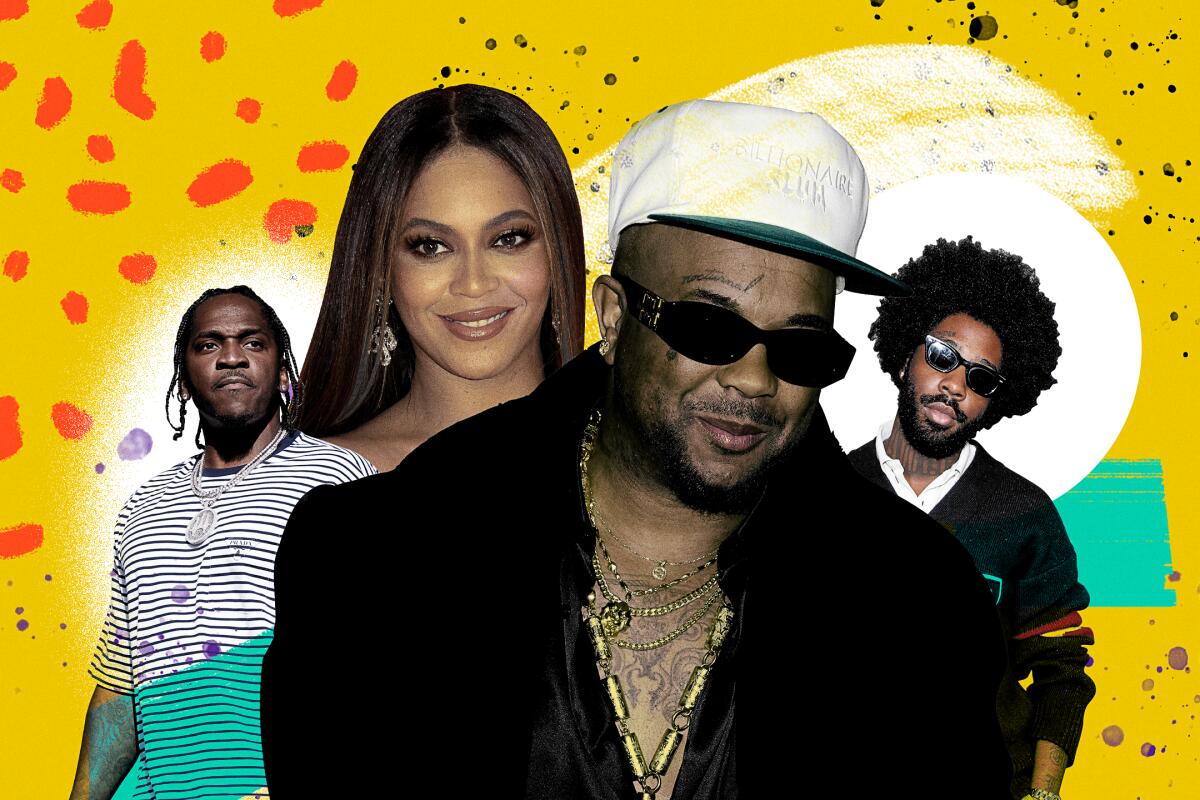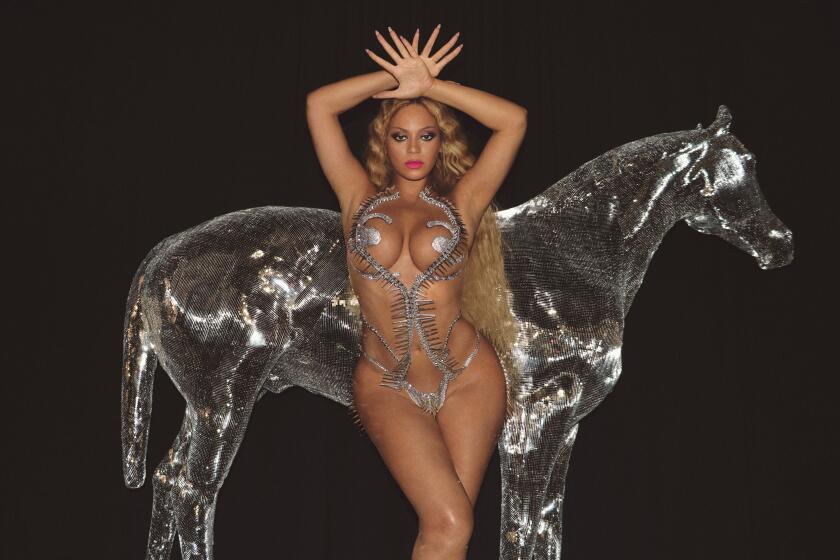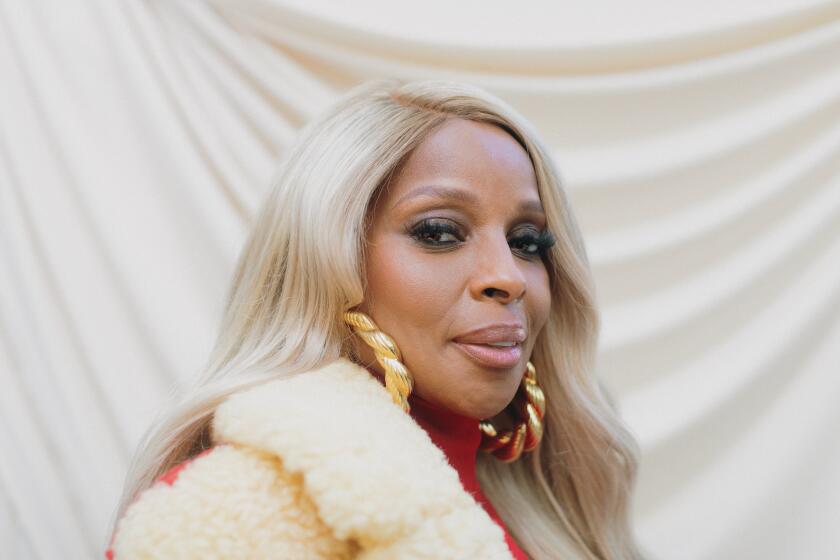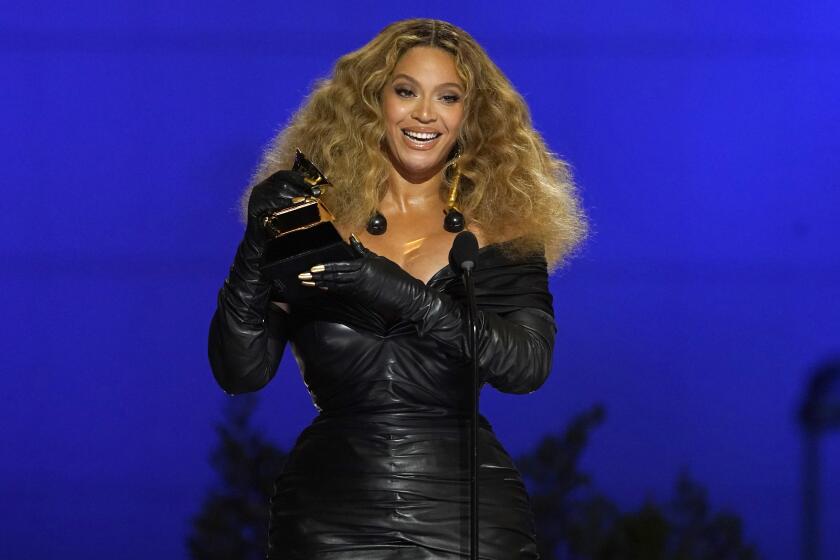‘Listen and weep!’ How Grammy-nominated hitmaker The-Dream propelled Beyoncé to even greater heights

- Share via
On a September evening in Manhattan, The-Dream, one of America’s greatest hitmakers, was in the Plaza Hotel. Also in the Plaza: seemingly all of the world’s diplomats and dignitaries. The U.N. General Assembly was in session just up the street. Stone-faced men in suits with badges pinned to their belts peacocked around. Security details fought each other to stuff their respective national VIPs inside elevators.
Rihanna’s “Umbrella,” Justin Bieber’s “Baby,” Beyoncé’s “Single Ladies (Put a Ring on It)” — the 45-year-old songwriter and producer has written or co-written touchstone after touchstone. Most recently, he worked extensively on Beyonce’s latest blockbuster, “Renaissance,” and the work paid off: On Tuesday, The-Dream was nominated for six Grammy Awards, including album of the year for “Renaissance,” song and record of the year for Beyoncé’s “Break My Soul” and songwriter of the year, non-classical. For now, though, The-Dream was stuck with all the rest of the regular non-U.N. folks, waiting for an elevator.
Beyoncé leads with 9 nominations, followed by Lamar with 8, Adele and Brandi Carlile with 7, and Harry Styles, Mary J. Blige, DJ Khaled and Future with 6.
The-Dream was raised in Atlanta, where he still lives with his family. (He and his wife, Lalonne Martinez, have four kids; he’s the father to nine children altogether.) He first came to New York as a fifth-grader to play the trumpet in the Macy’s Thanksgiving Day Parade with his school marching band. (Back then they called him Terius Nash.) He fondly remembers his bandleader, Mr. Styles, and their renditions of Gap Band and James Brown staples. He also remembers Mr. Styles rejecting his pleas to play Lionel Richie: “You’re not playing anything that says all night long!” Later, in his famously horny solo work, The-Dream would be less inhibited.

He grew up in the Baptist Church, which meant “everybody in the family sang. If you even went to church, you were in the choir.” There was an old, broken-down piano in his grandfather’s house that he loved to play around with after school. The first time he had his heart broken by music, he says, was when his grandfather sold it. But he never considered himself particularly creatively inclined. “It was just me being me,” he says. Another one of his childhood dreams was to design cars for Cadillac.
When he was 15, his mother died from cancer and his beloved grandfather, a stern cement mason, became his primary caretaker. Whatever the task — from roasting peanuts for his grandfather’s pinochle buddies to building a tool shed from scratch — it had to be done right. The lessons implanted: “We’re Black people coming from this space. We don’t have time to play around. Whatever your life is, it’s what you work for it.”
‘Renaissance’ reveals a depth of knowledge regarding rhythm and harmony that puts her as an arranger and bandleader on a level with Prince and Stevie Wonder.
When he was 19, his grandfather died after suffering a stroke. An inheritance dispute with his step-grandmother meant his grandfather’s house, which had been in the family for generations, was sold to split the profits. So just as he was making his first foray into the industry with songwriting sessions for local talent, Nash had $15,000 in inheritance money and almost nothing else. His peers and collaborators “still had grandfathers and mothers and homes,” he remembers thinking, while he now had to claw and scratch his way out of his grief.
He worked jobs in the day — at amusement parks, at steakhouses, at daycare centers — while working recording sessions all night. “That’s how I learned not to sleep,” he says. “Which is not so good now, because I can’t ever turn my brain off.” It was $200 a session here, $400 there, all cash. “I knew I was witty, I knew melody, I knew how to make sense,” he says. “I didn’t know it was called top-line writing.” But quickly, he’d hear, “Hey, write a hook! You’re the hook master!’ I’m like, OK, I guess I’m the hook master.”
While his friends were righteously partying through their 20s, he resisted temptations. “Everyone was at the club, telling me what I’m missing, showing me pictures. And the pictures weren’t that good at that time so you’re imagining s— is way better than what it was.” He remembers telling pals he wouldn’t smoke weed until he made a million dollars, and he remembers his best friend cracking, “Well, I guess you’re never gonna smoke.” (As it happened, he had to wait till 30.)

As a solo artist, his knowing pastiche, clever turns of phrase, and singular use of blank space have created a cultish following. His first three albums, released between 2007 and 2010 — “Love/Hate,” “Love vs. Money” and “Love King” — were minor radio successes. For hardcore R&B fans, though, they’re stone-cold classics. As a producer and songwriter (often working alongside his longtime creative partner Tricky Stewart), his credits go on and on. They include Kanye West’s “All of the Lights,” Kanye and Jay-Z’s “No Church in the Wild,” Jay-Z’s “Holy Grail,” Ciara’s “Ride,” Britney Spears and Madonna’s “Me Against the Music,” loads more songs for Beyoncé and Rihanna and Mariah Carey, and at least one single for Kim Kardashian.
“Renaissance” is a different kind of accomplishment: a piece of music gargantuan in its carefully crafted density. It already feels timeless. “Most of the writing took place not in a fancy place” — he waves a dismissive hand at the multicolored petit-fours and the bottle of Brut on the table in front of him. While the recording HQ was a house in the Hamptons, The-Dream posted up in a trailer out front. He wanted to be forced to feel hungry. “I need to write like I’m trying to get out of here,” he says. It was that feeling that led to lines like “Now, I just fell in love / And I just quit my job,” on “Break My Soul.” “Now everyone’s saying, ‘Oh, my God, this is crazy, where did this come from?’ It came from us in the dark in a f— trailer.”
Mary J. Blige’s 6 nominations are a pleasant surprise; Nicki Minaj’s zero won’t sit well with the Barbz.
During the creative process, The-Dream says, “I don’t have any fear at all. I welcome whatever — I want all the smoke. Bey is unafraid too. That’s my Virgo sister.” Together, they put their heads down and push through songwriting blocks. “I can try it a thousand times,” he says. “I have no ego. The only thing she can do is make me write a part better, make me play a part better.”
While The-Dream was one of her primary co-writers, “Renaissance” was made by a swirling pool of talent, orchestrated by Beyoncé. Everyone from Skrillex to Grace Jones has credits. “We could have easily made it about a money grab and spent the whole time just me and her writing the whole thing,” The-Dream says. But Beyoncé wanted a collective effort. “We haven’t even spoken about it that much, but in our minds — the world was in a space. What better place to gather than here on Beyoncé’s album?”
The critically acclaimed ballad “1+1,” from Beyoncé’s 2011 album “4,” was “a hundred percent” written by The-Dream “in Vegas, by myself, chilling. I’m not trying to be funny, but that’s actually not that hard. To make something cohesive with as many moving parts” as there were in the “Renaissance” sessions — “that’s not easy! Watching her put these things together, that’s the part that nobody knows about Bey and producing. She’s saying, ‘No, drop the key on that,’ ‘No, slow it down.’ These magical things she does that nobody sees. It’s not like she tours and she’s gonna show you this s— on stage. It’s two different people.”

Over his decades writing for hire, The-Dream says, “I’ve seen them all. I know all the artists and the s— that they do. There’s certain artists that hear a song and won’t even start to sing it. The greatest thing about Bey — she gon’ try it. If it don’t work, it just means you got the biggest star in the world not afraid to try a thing. That is a thing you rarely see. It’s only the greatest that do it! Which is the craziest thing to me.”
Looking at the end product now, The-Dream says, “It might sound blasphemous, and I hate to say it because there’s so many people that have written for her and beside her on other albums that I’ve been on, but” — he takes a long pause — “this is probably her best record. There’s no way around it for me. This is one of those ones. And how graceful she is about it, to let it live without videos. You know she got ‘em. They’re beautiful. They’re gonna come. But it’s telling, and it should be to everybody — in our clique, the consensus is, let it breathe. Let it smoke for a second. Let that wine breathe. Fear? Evidently not. Listen. Listen and weep!”
The 2023 Grammy nominations were revealed today, in 91 categories. Beyoncé leads the field with 9 nominations.
Mid-chat, he breaks into spasms. It takes a moment for what’s happening to become clear. He’s sounding out metal-shredding noises with his mouth, while furiously playing the air guitar. It’s — it’s Marty McFly, from the rock scene in “Back to the Future.” “‘It sounds a little crazy now, but your kids are gonna love it.’ I think about that all the time.”
The-Dream occupies a unique place in pop culture. He’s not known enough to get swarmed in public, but he is influential enough to have the ears of A-listers. (He says he’s been convincing all his famous pals to get on the Kevin Costner neo-Western “Yellowstone.” “Jay hit me like, ‘Hey, what thing is that on?’ ”)
“I got songs that would mean I would have to go in hiding,” he boasts. “I have those records. My kids are going to be salivating after I pass out. ‘Is he dead? Oh, we love Daddy, but he gone, let’s put the pop records out.’ But you won’t get those songs from me ‘cause it’s too early. I need a cartoon to sing that. I need a movie to do that. Nobody has to understand the s— I’m talking about. Do I want them to understand? That means I gotta wait for a second.”

Like many of his peers, The-Dream feels that some of his best work has been overlooked by the Recording Academy. That doesn’t mean he’s come to the conclusion that many others have, which is that the Grammys are not now, nor have they ever been, accurate arbiters of quality or taste.
“Accuracy is the wrong way for me to look at it,” he says. One of the five Grammys he has won was a song of the year statuette, for “Single Ladies.” “You realize the song can’t be good enough,” he says. “It has to be astonishing! It has to be culture moving. ‘Did you see Tom Hanks doing the “Single Ladies” dance?!!’ That means I wake up already on a thousand.”
He’s saying he has to write songs so big they’re impossible to miss. Which, as he’s mentioned once or twice, is actually quite easy for him to do.
“They don’t make music on this planet that I couldn’t do at a very high quality,” he says. “It doesn’t exist. I found the exact reason why I’m on Earth. I’m like a mustang in the wild. Just running. This is gonna be a beautiful day. How do I know? Because I got legs and I don’t see nothing but field. Let’s go. Nothing’s gonna stop me.”
More to Read
The biggest entertainment stories
Get our big stories about Hollywood, film, television, music, arts, culture and more right in your inbox as soon as they publish.
You may occasionally receive promotional content from the Los Angeles Times.














